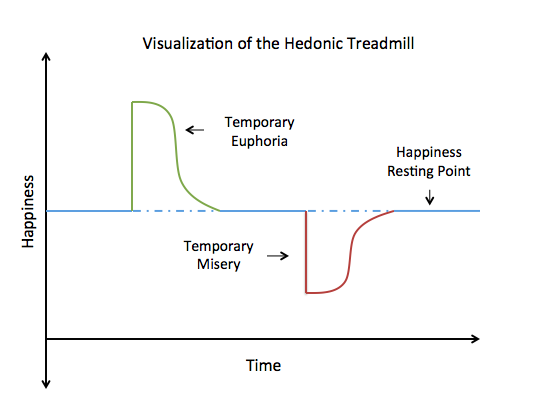I am currently following a course on Coursera: The Science of Well Being. It has been one of the most famous online courses by Yale, to date, and my favorite so far. If you haven't checked it out, I recommend you do it.
There is a concept discussed in almost every lecture 'Hedonic Adaptation'. Which, simply put, states that
On average, a person's happiness remains almost linear throughout his life. We get used to everything.
We envision, that a big positive event such as buying your first car will make you really happy. Well, it does, but only for a few days. Let's say till the new car smell wears out or you get the first scratch on the bumper.
On the other hand, we envision that those big negative events will make this life a living hell, well guess what, we get used to it as well. Do you remember the paranoia in April-May? Everyone was refreshing Worldometer 20 times a day, washing groceries with dish soap, and even crossing the street if you spot a pedestrian walking your way! ... and now, almost no one seems to care!
 |
| Image Source kadampalife |
Hedonic Treadmill
It is the exact same reason the concept is also referred to as the Hedonic Treadmill. We are running on a treadmill, trying to maintain the state of euphoria by chasing Instagram likes, buying new things, searching for those 15 minutes of fame. But alas, this survivalist brain of ours brings us back to where we started.
I read a very interesting example today about this - We can now purchase and download all our favorite songs on our phones and can, and actually do listen to them whenever we want. But does it give the same burst of excitement if the song unexpectedly comes on the radio or you hear it being played in a car passing by?
This example can really be tied to the age-old adage that we hear from monks and minimalists. Experience over Things.
Once you own a song, after the first few times, your brain knows it resides in your pocket, and you can listen to it anytime. Meh. Takes away the excitement. While, as is the case with all experiences, listening to it on the radio is a once in a while event, can not be done on-demand and actually has a surprise element to it!
Can we alter the baseline?
- Savoring: The act of stepping outside of an experience to review and appreciate it
- Gratitude The quality of being thankful and a tendency to show appreciation for what one has
Ending Notes
I still have about 3 weeks of the course to go. Will add here or in a new post if I find more such interesting nuggets. For now, I will leave you with my favorite quote of the week.
A new car sticks around to disappoint you. But a trip to Europe is over. It evaporates. It has the good sense to go away, and you are left with nothing but a wonderful memory. --Dan Gilbert
